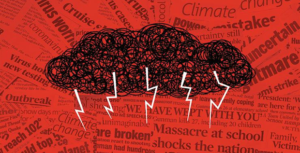By Julia Roman, NAMI Mercer Fall 2023 Intern
Traumatic events have a large impact on one’s mental health. Many experiences in life can be classified as trauma, including single events, ongoing stress, living in an unhealthy environment, or seeing someone else get hurt. These events can lead to PTSD and other mental health conditions, as memories of trauma can be extremely detrimental to one’s mental state.

Trauma can also be experienced from outside sources, including the news. The news often presents content that can be detrimental to our mental health, such as detailed stories or graphic images. Events such as mass shootings, information about climate change, or political unrest can affect us more than we think. Additionally, more media outlets expose us to the news than ever, including social media platforms such as X, Instagram, or TikTok. We may think that we are desensitized to this information, but in reality, having constant access to this negative content affects our overall mood and can lead to mental health struggles.
This phenomenon was widely studied throughout the COVID-19 pandemic when people were constantly exposed to anxiety-inducing content from media outlets. Those who participated in “doomscrolling” – a term that emerged during the pandemic to describe the negative impact of too much exposure to negative content – were more likely to experience negative mood, and depression, anxiety, and PTSD symptoms.
Recently, the Israel-Palestine conflict has caused a tremendous amount of tension due to the complexity of emotions surrounding the issues. The coverage of this conflict has been nonstop, with many violent and graphic content being shared on social media and from news sources. Images and videos are easily accessible and can cause feelings of anxiety and depression. The constant access to this negative content can impact sleep habits, productivity, stress levels, and sometimes even PTSD symptoms.

The problem lies in the fact that many people want to stay knowledgeable about current events and are unsure how to do so without causing mental health struggles. While it can be difficult to draw the line between being informed and being over-informed, we must protect our mental health. Below is a list of best practices to employ when consuming the news:
How to be a Mindful Media Consumer
- Turn off notifications from news sources.
- This will allow you to not be bombarded with negative content all day long.
- Set boundaries for yourself.
- For example, only watch the news for a certain amount of time each day. Experts recommend 30 minutes per day. Also, set limits on the time of day you are consuming the media, and keep in mind that it is detrimental to watch traumatic events right before going to sleep.
- Curate your social media feed to fit what is best for you.
- Choose a few news sources that you trust, and mute or unfollow the rest. Also, do not feel guilty for muting or unfollowing friends/family members who post content that causes stress.
- Practice mindfulness.
- If you feel yourself becoming stressed or overwhelmed by the news you are consuming, it is best to take a break. Do not feel guilty for needing to protect your mental health.
- Take care of your overall mental health by going for a walk, meditating, or doing deep breathing exercises.
- This will help you reduce your overall stress levels, which can help when you feel stressed from watching the news.
Sources
- https://www.mentalhealth.org.uk/explore-mental-health/a-z-topics/trauma#:~:text=Trauma%20can%20make%20you%20more,difficulties%20in%20your%20daily%20life.
- https://www.apa.org/monitor/2022/11/strain-media-overload
- https://www.hartsteinpsychological.com/how-exposure-to-the-news-can-impact-your-mental-health#:~:text=Each%20time%20we%20see%20or,anxiety%20and%20sense%20of%20safety.
- https://www.cnn.com/2023/10/14/health/mental-health-israel-hamas-wellness/index.html
- https://www.cbsnews.com/philadelphia/news/israel-palestine-war-conflict-mental-health-gaza-strip-hamas/